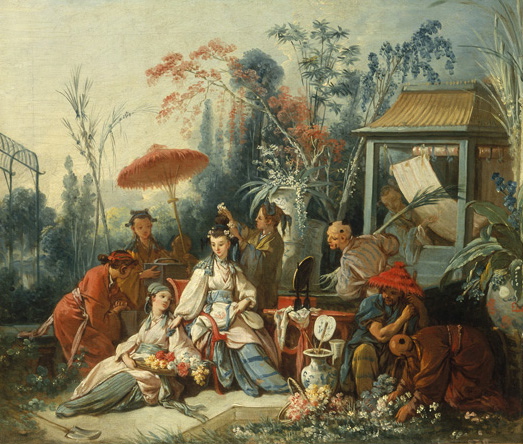(The Chinese Ladies)

Vue d'un jardin chinois
François Boucher (1703-1770)
Besançon (France), Musée des Beaux-Arts et d'Archéologie
(Photo Charles Choffet)

Tangìa
Tangìa
Sì io
vado a
incominciar.
Yes,
I will begin.
Lisinga/Sivene/Silango
Lisinga/Sivene/Silango
In fine
comincerai.
At
last you will begin.
Tangìa
Tangìa
Attenzion,
attenzion.
Attention,
attention.
Già
verbigrazia. Suponete,
If
you please! Imagine. . .
Ma
saria, meglio che Lisinga
But
don't you think it would be better
incominciasse in vece
mia.
if
Lisinga went first instead of me?
Lisinga/Sivene/Silango
Lisinga/Sivene/Silango
Ma questa è una gran seccata But this is a nuisance!
l'aspettavo in fede mia. We were waiting in good faith.
È una vergogna Tangìa This is a disgrace, Tangìa,
e ti devi vergognar. and you should be ashamed of yourself!
Sì! È una vergogna
Tangìa
Yes! This
is a disgrace,
Tangìa,
e ti devi
vergognar.
and
you should be ashamed of yourself!
Tangìa
Tangìa
Son semplicetta
vergognosetta.
I'm
just a simple little thing, and so shy.
Lisinga/Sivene/Silango
Lisinga/Sivene/Silango
La semplicetta
vergognosetta.
She's
just so simple and shy.
Tangìa
Tangìa
Non ho talento per
imitar.
I
have no talent for acting.
Lisinga/Sivene/Silango
Lisinga/Sivene/Silango
Non ha talento per imitar.
She
has no talent for acting.
Tangìa
Tangìa
Son timorosa, non
capricciosa.
I'm timid,
not
capricious.
Lisinga/Sivene/Silango
Lisinga/Sivene/Silango
È timorosa e capricciosa.
She's both
timid
and capricious.
Tangìa
Tangìa
Non potrò mai
rappresentar.
I'll
never be able to perform.
Lisinga/Sivene/Silango
Lisinga/Sivene/Silango
Non vorrà mai
rappresentar.
She'll
never want to perform.